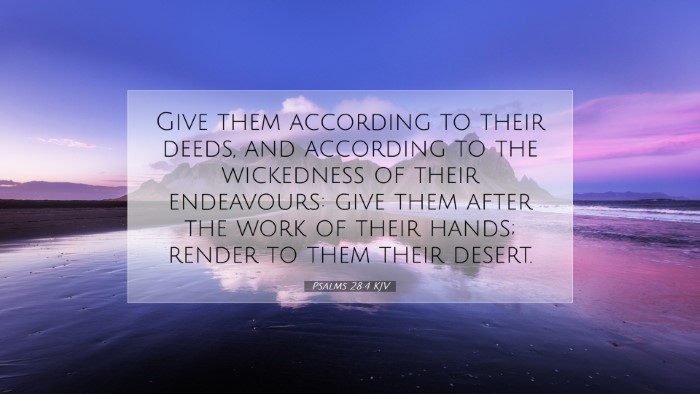Commentary on Psalms 28:4
Psalms 28:4 states:
"Give them according to their deeds, and according to the wickedness of their endeavors."
This verse is a plea for divine justice, focused on the retribution that the wicked deserve based on their actions. It reflects a deep theological understanding inherent in the Psalms, emphasizing the importance of righteousness and the consequences of evil deeds.
Exegesis and Theological Insights
The verse serves as part of a broader dialogue throughout Psalm 28, which can be seen as a combination of supplication and proclamation of faith. Notably, the Psalmist juxtaposes the fate of the righteous with that of the wicked, underscoring the moral order that governs the universe from a biblical perspective.
Matthew Henry's Commentary
Henry emphasizes the principle of divine retribution in this verse. He notes that the supplication reflects a desire for justice: “As God deals with men according to their ways, so his people, in their prayers, conveniently ask that they may receive according to their works.” This recognition of God’s righteousness underlines a biblical worldview where justice prevails and evil is ultimately confronted.
Furthermore, Henry notes that the phrase "according to their deeds" conveys the idea of a direct correlation between one's actions and the resultant divine judgment. The wicked, by their very endeavors, set themselves upon a trajectory leading to their own downfall. It is consistent with the larger biblical theme echoing throughout the Old Testament that God stands against those who oppose His will.
Albert Barnes’ Perspective
Barnes elaborates on the aspect of human tendency towards malignity, stating that those who engage in wrongdoing often do so relentlessly. The verb “give” reflects a call for God to mete out justice in accordance with the wicked's actions: “The Psalmist does not wish for any arbitrary punishment, but just what their deeds deserve.” This reveals a nuanced understanding that divine justice must align with actual human behavior, grounding ethics firmly in accountability.
Barnes also highlights the broader implication of this kind of prayer within the context of communal living. When the wicked prosper, it poses a theological dilemma for the faithful. This verse serves as a reminder that in the eschatological framework of the Psalms, justice will ultimately prevail, and the Psalmist finds solace in a God who sees all deeds and judges your works accordingly.
Adam Clarke's Analysis
Clarke emphasizes the importance of understanding sin and its ramifications. He explains that the cry for justice here can be seen as an intrinsic response to perceived injustices afflicting the righteous. He suggests that the imprecation here is not spiteful but arises from a profound longing for righteousness to be manifestly upheld: “It is not the spirit of revenge, but the spirit of justice and righteousness that prompts the prayer.”
This distinction is critical for students and pastors alike, as it reorients our understanding of seeking justice within the framework of the heart's condition before God. Clarke concludes that the acknowledgment of God’s judgment is not merely theoretical but deeply practical, providing a foundation of hope for those who suffer under the weight of injustice.
Application for Pastors and Theologians
The theological implications of Psalms 28:4 extend into pastoral care and theological education. This passage invites pastors to engage their congregations with a robust theology of justice, reassuring them of God’s linkage between human behavior and divine response. It serves also as a springboard for discussions on the nature of human evil and its eventual consequence in light of God’s sovereignty.
Preaching Insights
- Justice and Righteousness: Highlight the biblical foundations of justice, encouraging the congregation to seek righteousness in their own life choices and interactions.
- God’s Faithfulness: Emphasize the faithfulness of God to bring justice in His timing, reminding believers that they are not abandoned in their struggles.
- The Role of Prayer: Teach on the importance of prayer in seeking divine intervention and understanding the heart behind requesting justice.
Conclusion
Psalms 28:4 encapsulates a profound truth about divine justice that resonates throughout scripture. By aligning insights from various public domain commentaries, we appreciate the depth of the Psalmist’s plea and its relevance for both individual believers and the church community as a whole. As we delve into the nature of justice, let us be reminded of our call to walk in righteousness, ever aware that our deeds do not go unnoticed by the Almighty.


